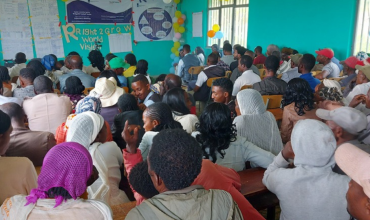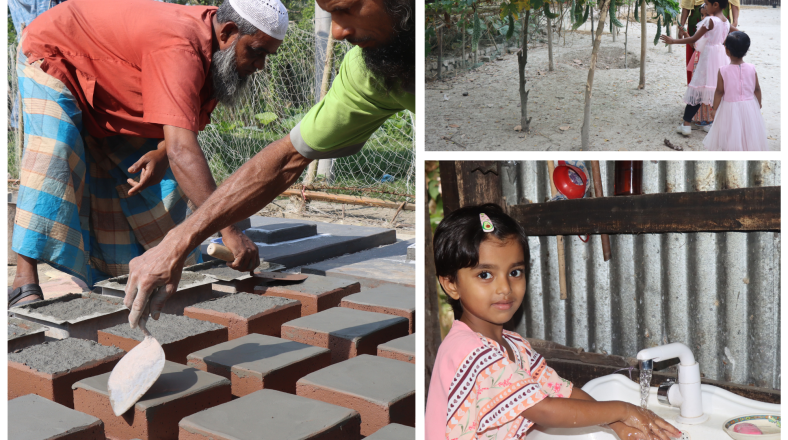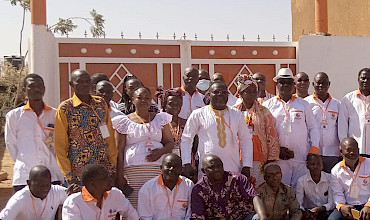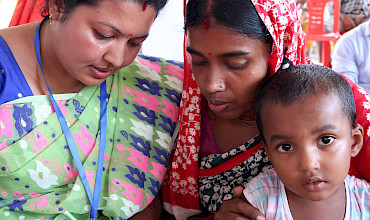
In the journey to zero undernutrition and zero people without access to water, sanitation and hygiene (WASH), the voices of communities and Civil Society Organisations (CSOs) are crucial.
By working closely with both CSOs and local government, Right2Grow helps to create the right conditions for people to raise their voices and advocate for their rights to fair service provision. A beautiful example of how this can be done is through the interactive Budget Monitoring and Expenditure Tracking tool (hereafter referred to as BMET).
What is the BMET tool and how does it create transparency and accountability?
The BMET tool is a web-based app that tracks local governments’ budget allocations, specifically its financial investments in Food and Nutrition Security and WASH interventions.
These budgets are openly displayed in an online environment, making it possible for both local government employees as well as civil society organisations to monitor them. In essence, this increased transparency enhances accountability and service delivery on the side of the local government: it can track whether the budget allocated to WASH and Food and Nutrition security (FNS) is spent as promised.
The tool also generates data, which, combined with data collected on WASH and Nutrition usage in the Right2Grow programme areas, and child growth rates, can create powerful evidence on the importance of investing in WASH and Nutrition services by government.
Setting the scene: how is the BMET tool implemented in Bangladesh?
In Bangladesh, local-level annual budget decisions are made at the Union Parishad level – the smallest tier of local government. Each Union Parishad is divided into nine wards. Before any budget decisions are taken, it’s mandatory for all Unions to meet with these wards and find out their needs.
This is where CSO voices are crucial: they can bring their communities’ challenges to the forefront and help propose solutions. Through training and support, Right2Grow helps these CSOs to act as brokers for the voices in its community, and encourages them to structurally participate in these, and other WASH, Health, and Nutrition related committees’, meetings.
The Horizontal Learning Programme Foundation (HLP-F) was recruited for technical and capacity building support on the BMET tool, which was developed for the Right2Grow consortium specifically. HLP-F closely supports the local government institutions with digital annual budget development and expenditure tracking after they have met with the wards. They also provide technical support for both the Union Parishads and the CSOs in accessing and using the BMET tool, holding the Union Parishad accountable. On a local policy level, Right2Grow has proposed 16 points of intervention for annual budget planning in the areas of Nutrition, WASH, and Mother and Childcare.
Joint efforts by CSOs to raise community voices
Mr. Bashir Uddin Gharami, General Secretary of a CSO in the village of Pyarpur, Chotto Bighai Union, had the following to say:
“I have been able to raise my voice in the presence of the Union Parishad Chairman and government officials to demand budget for addressing required WASH-Nutrition & Child health services of my own community. This way we, the CSO members, are jointly working to raise our voices for the rights of the children under five. I have a soft spot for the wellbeing of the children. When I work for their rights, I can visualise the face of my own daughter. The Right2Grow project contributed a lot to opening my eyes, changing my beliefs, but also capacity building and boosting my inner force to work on local level initiatives for long lasting change in vulnerable communities, especially for children”
What has been achieved so far, and what will be the long-term impact?
Right2Grow is working in 40 Union Parishads, reaching more than 165,000 people. To date, more than 21 Union Parishads have improved access to WASH and Nutrition, through increased spending and clearly communicated community needs. The budgeted money is being spent based on the identified community needs through various initiatives. An example is the provision of growth measurement tools, such as weighing machines and height measurement scales, as well as supplies of micronutrient powder to community clinics for malnourished children. Almost all Unions provided food supplements to the very poor, including households with children under 5.
More than 250 hygienic latrines have been installed based on the demands of CSOs, as well as more than 22 safe water access points.
To encourage pregnant and lactating women to attend ante- and postnatal care services offered by community clinics and health centres, some Union Parishads have completely subsidised the transportation, removing a great obstacle to healthcare in remote rural areas.
We aim for this two-tier system of increased advocacy on behalf of the CSOs and strengthened accountability on behalf of the local government to positively impact child growth through increased access to WASH and Nutrition. The usage of the BMET tool will keep these structures in place, and the data gained from the tracker can be used for advocacy on WASH and Nutrition services on a broader, national level.
Back to overview

